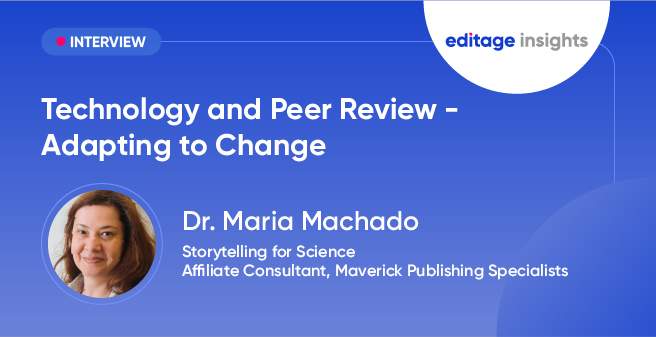Technology and peer review: An interview with Dr. Maria Machado

“Transparency in the development of all technology is key for its swift adoption by the academic community.” – Dr. Maria Machado
As a part of our Editage Insights interview panel for Peer Review Week 2024, we were fortunate to get several thought-provoking insights from Dr. Maria Machado. Maria is a writer, reviewer, analyst, and blogger. Throughout her scientific career, she published on microcirculation and vascular physiology.
At Bio-protocol, she edited papers, produced research article templates, and streamlined peer review processes. Now, she specializes in reviewing scientific papers (over 500), FAIR research design, and science communication. She can be regularly seen volunteering in events such as Pint of Science or European Researcher’s Night, attempting to bring scientists and society closer via clear communication (https://stories4sci.blogspot.com/).
She hopes to standardize peer review practices through training and is the co-chair of Peer Review Week 2024. Her passion for multiculturalism and open science is rooted in her experience as a nomadic scientist living and working in many different places. She advocates for transparent practices, equity, and effective training.
Here is what she had to say about adaptation to the changing landscape of peer review:
In your opinion, what are the most promising technological advancements in peer review, and how do you see them shaping the future?
I have recently become aware of a Peer Review GPT developed by Razia Aliani. This is the most sophisticated of the AI tools that I’ve seen thus far. It could really help researchers tailor their manuscripts to editorial standards… I’m not sure about critical reasoning, divergent thinking, creativity, and true innovation, though…
With the rise of AI-driven tools in peer review, how can we ensure that the integrity of the review process is maintained?
Transparency in the development of all technology is key for its swift adoption by the academic community. Some rules need to be established to enable authors and copyright holders to learn about the usage their intellectual property is subjected to.
What measures should be taken to balance human judgment with technological assistance in peer review?
Completely entrusting peer review to AI tools is wrong, as a lot of ethical and common-sense issues are inherently framed for a human mind. I believe there is a role for AI-enabled techniques to aid in translation, content summarization, editing, and formatting during the review process, but final judgment and evaluation needs to have the human touch.
What are the main challenges or barriers to the adoption of new technologies in peer review?
The dark box nature of the peer review process itself. A lot of researchers are unaware of what goes on behind the scenes when they submit a paper to a journal. Automating that process completely dehumanizes it further. The key is to engage researchers in the publishing and peer review process itself, so that they can experience how advantageous some technologies can become.
How can institutions and publishers support reviewers and editors in adapting to these technological changes?
UX has a huge role to play in this. The more advanced the technology, the more intuitive its use needs to be for smooth adoption. Continually adapting, seeking and incorporating feedback, adjusting to the evolving landscape of the publishing industry is an ongoing and tremendous task that should have dedicated support within academic institutions, with the support of publishers. When was the last time that a university press trained their own host institution researchers in peer review? Did they do a good job?
How can the academic community address the skepticism or resistance some may have toward integrating technology into peer review?
The advantages of any innovation need to be demonstrated frequently, so that the highly critical academic community trusts the data enough to make a decision. Comparing the features of processes that are technology-driven to those that are reliant on legacy processes, highlighting the time-saving advantages, and providing appropriate recognition are all ways in which peer review can become the bridge between the academe and scholarly publishers.
Looking ahead, what trends in technology do you think will have the most significant impact on peer review over the next decade?
Automating features of research design planning, systematising literature searches and reviews, data annotation and analysis, curating metadata, and creating innovative data visualizations.
How can we prepare for the potential challenges and opportunities that these future trends might bring?
As with every new challenge, remain open to adapt and learn. Experiment. Personalize your workflow to suit you. Trends come and go, but real advantages are acknowledged by the majority and endure. Don’t get too attached to any one tool to do the work that is inherently yours to tailor to your own abilities, weaknesses, and strengths.
Comments
You're looking to give wings to your academic career and publication journey. We like that!
Why don't we give you complete access! Create a free account and get unlimited access to all resources & a vibrant researcher community.

Subscribe to Journal Submission & Peer Review













